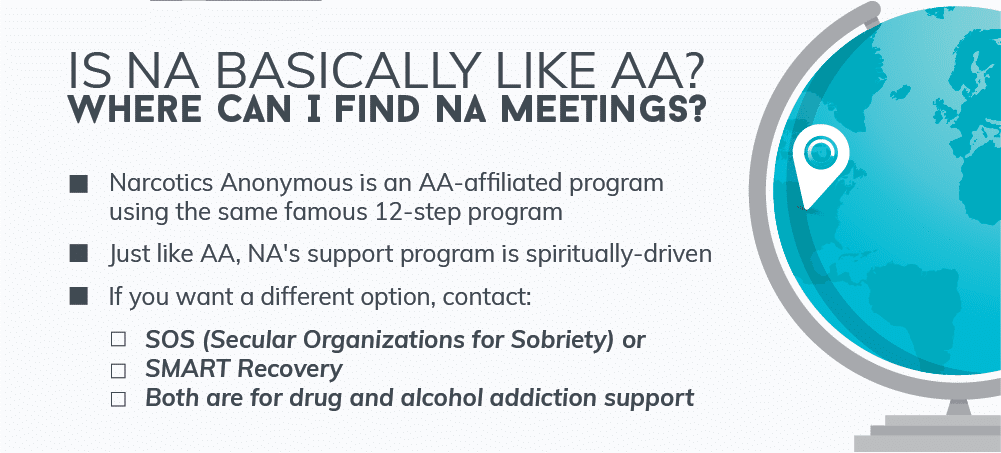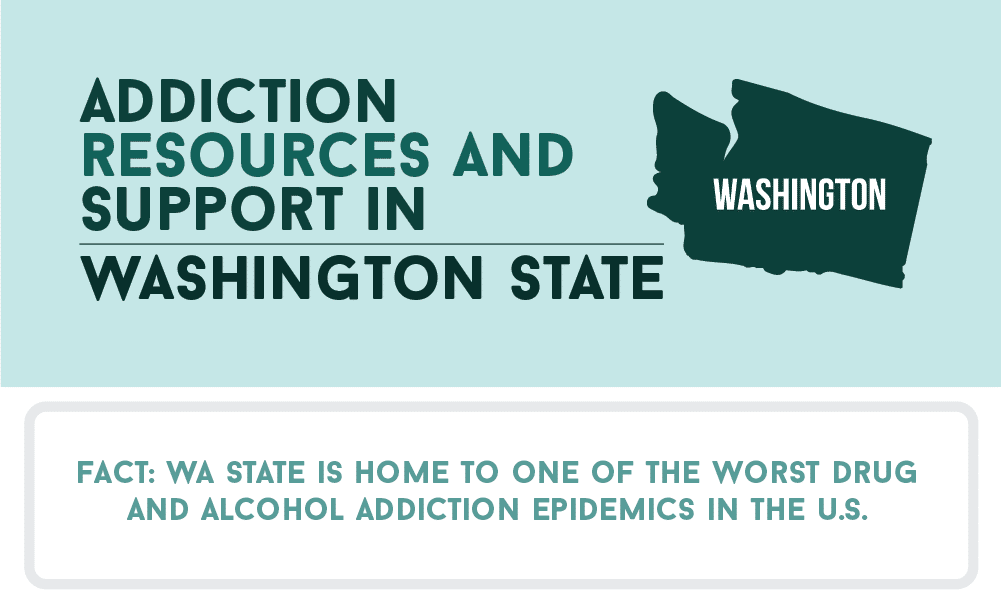
Addiction Resources and Support in Washington State
Washington State is one of the most picturesque and diverse places in the entire country. It’s also home to one of the worst drug and alcohol addiction epidemics in the country.
On this page, we’re going to break down some of the features of addiction, and what you can do in Washington to get help for them. First, let’s talk about the facts of addiction in general.
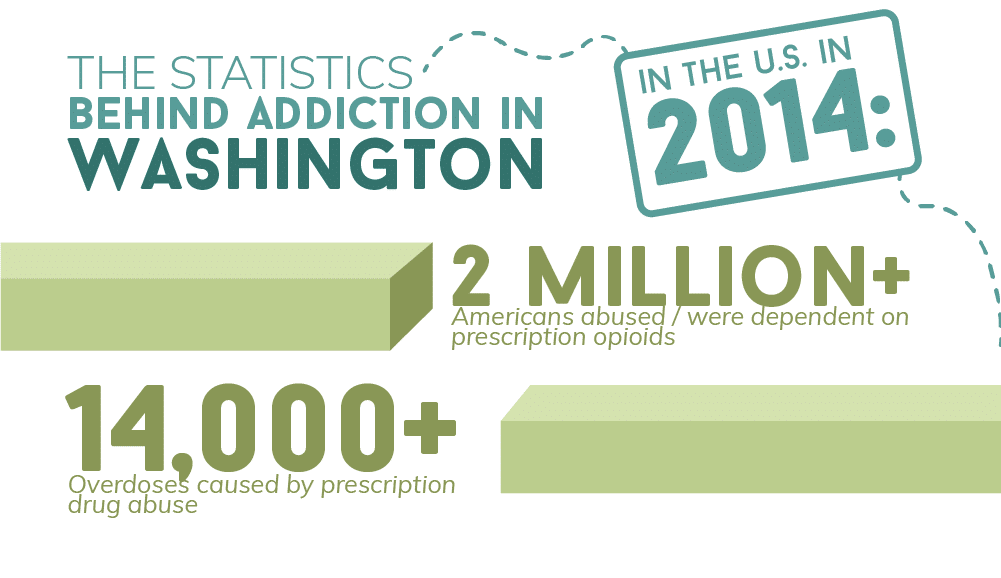
The Statistics Behind Addiction in Washington
Addiction has many forms. It stems from all sorts of substances, both legal and illegal. Sometimes addiction is obvious and destructive, and sometimes it is quiet and hidden, but it is always harmful to everyone involved.
According to the Center for Disease Control (CDC), over 2 million Americans abused or were dependent on prescription opioids like Oxycontin and Vicodin in 2014. Over 14,000 overdoses in 2014 alone are attributed to prescription drug abuse.
Prescription opiates make up a huge percentage of drug rehab admissions in Washington, and in fact, this is an addiction epidemic that is increasing in severity all over the country. But it’s far from the only drug problem. Methamphetamine and heroin are still the two most widely-used and threatening illegal drugs in Washington. In fact, meth-related deaths in the Seattle/King County area have gone up 500% since 2010.
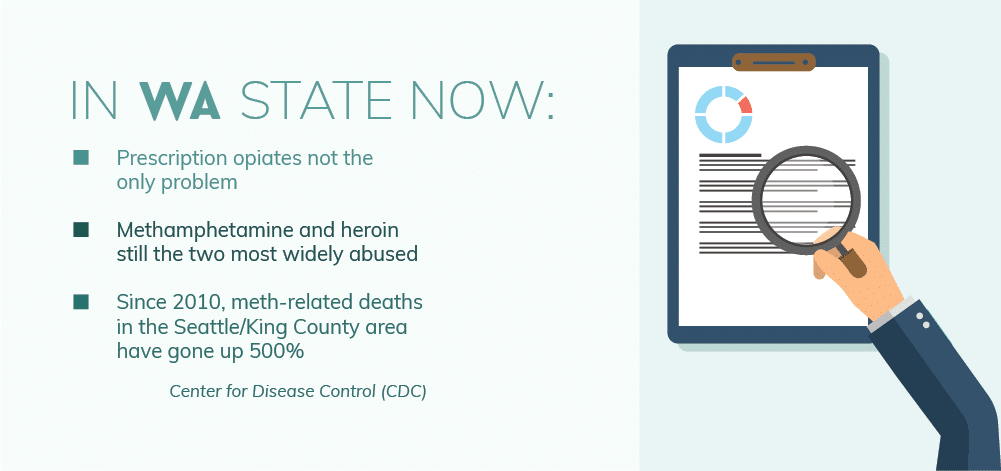
Specific Addiction Resources in Washington:
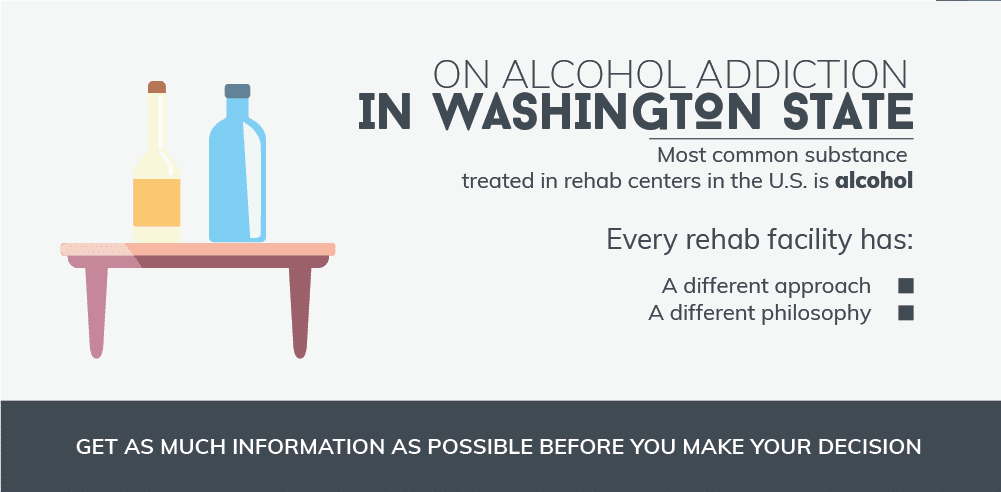
Select Your City to Find Local Addiction Resources
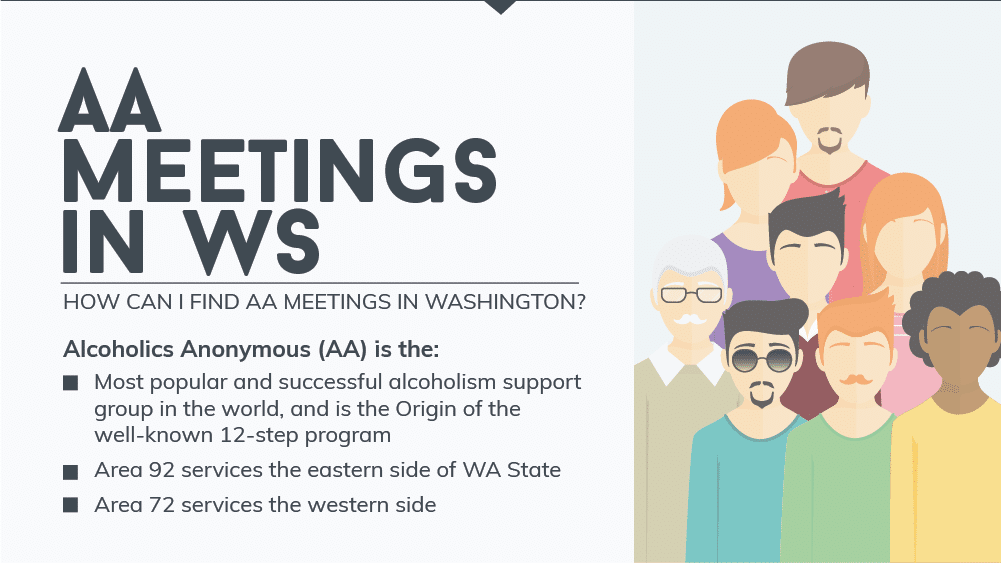
On Alcohol Addiction in Washington State
Alcohol addiction is one of the most common and destructive forms of addiction. Alcohol is legal and easy to access, and it’s easy to forget that it can be addictive. Many times, that addiction can be even more difficult to recognize than drug addiction, because the consumption of alcohol is normalized in society, whereas people are more inclined to sense a problem if they see drug use.
But alcoholism is a very real disease, and it remains the most common substance treated in rehab centers across the entire country. You may think you just drink to have a good time, or that you don’t have a problem because you don’t do the harder drugs. But if you’re a frequent drinker of alcohol, and you find it increasingly difficult to feel like yourself without a few drinks, it may be time to give us a call and determine if you have a problem that needs treatment via rehab.
There’s no one right way to go through rehab, but there is a right way for you. Choosing the right rehab facility for you is almost as important as making the choice to go to rehab in the first place.
Every rehab facility has a different approach, a different philosophy, a different way of approaching similar issues. Gathering information is the best place to start. Some alcohol rehab facilities are likely to be a great fit for you, and some maybe aren’t.
We want you to choose Northpoint Seattle, but more than that, we want to empower you to make the best decision for your recovery, whatever that may be. We want to give you all the facts so you can make the best decision for your situation. This recovery is your journey, and you deserve to have all the information you can before choosing where to take the first steps toward the rest of your life.
On that note, here are some alcohol recovery resources around the state that might be able to help you.
Alcoholics Anonymous (AA) is the most popular and successful alcoholism support group in the world, and it is the origin of the well-known 12-step program. AA has helped millions of alcoholics overcome their problems, and can be a great supplement to a traditional rehab program, or even a great recovery plan on its own.
There are AA meetings all over the state of Washington, and there are sure to be events happening near you.
Area 92 services the eastern side of the state, while Area 72 handles the western side. Both areas are divided into several different districts, ensuring that there are meetings and events happening near you no matter where you are in the state.
Some meetings are multilingual, some are specifically for new members, and some are open meetings you can bring family members to for support. Whatever kind of meeting you’re looking for, you should be able to find a gathering or event that suits you, and then you can start getting connected with a strong peer support network.
Dealing with addiction isn’t a one-person thing. Watching a loved one struggle and flounder in the grips of alcoholism is difficult. Trying to help them out of it is even more so.
Al-Anon is a group that isn’t for the alcoholics themselves – it’s to support those around the alcoholics who are working to cope with their own emotions and also help them lift their loved ones out of the deep end of addiction. It’s a tough job, playing the support role for someone an alcoholic. Much of the time it’s thankless work for much of the process. But you stick with it, because that’s what love is, and seeing your loved one regain their independence and their personal spark is worth it.
So that’s what Al-Anon is for. Al-Anon meetings help people to really understand their loved one’s recovery. It’s for those who want to be the rock during the recovery process, but also need support dealing with the emotional issues that come with it.
You can find Al-Anon meetings all over the state of Washington, and because the group is affiliated with AA, the support network associated with Al-Anon is robust.
Alateen meetings are generally included in Al-Anon listings, as well. Alateen is effectively the same type of program as Al-Anon, but it reaches out specifically to teenagers who have friends and relatives struggling with alcohol. This may not seem like an important distinction, but the struggles of young people with alcoholics can be distinctly different from those of adults.
Alcoholics Anonymous does great work for millions of people, but the 12-step program is a spiritual approach to recovery in which most meetings begin and end with prayer. There’s nothing wrong with that approach, but it simply doesn’t speak to everyone.
That’s okay, though. There are plenty of alternative programs with the same aims of helping people beat alcoholism that let you check your faith and beliefs at the door.
Secular Organizations for Sobriety (SOS) is a 30-year-old organization that provides an alternative path to recovery. SOS isn’t as big a program as AA, but they have a proven track record of success, and are a great alternative if you’re looking for a support group that lets you keep your faith private.
SMART is another great alternative to AA. Their plan involves only 4 steps, not 12, and focuses on self-empowerment and self-reliance. There aren’t quite as many meeting for SMART Recovery than AA, but you can still find weekly meetings all over Washington.
We actually have a whole page on the ins and outs of alcohol detox, but here’s the short version.
About 50% of alcoholics experience some kind of withdrawal symptoms when they try to quit drinking alcohol. These withdrawal symptoms can last from a few days or a few weeks, and can range in severity from slight nausea and irritability to violent seizures and hallucinations. The more serious side effects can lead to serious complications and even death, which makes medical attention a very common need.
Alcohol withdrawal is one of the most serious forms of withdrawal there is, as it has one of the highest fatality rates. Detox is where you can get proper medical and holistic care to deal with those serious withdrawal symptoms and get your rehab off on the right foot. Not everybody needs detox treatment, but for some, it’s literally a life-and-death choice.
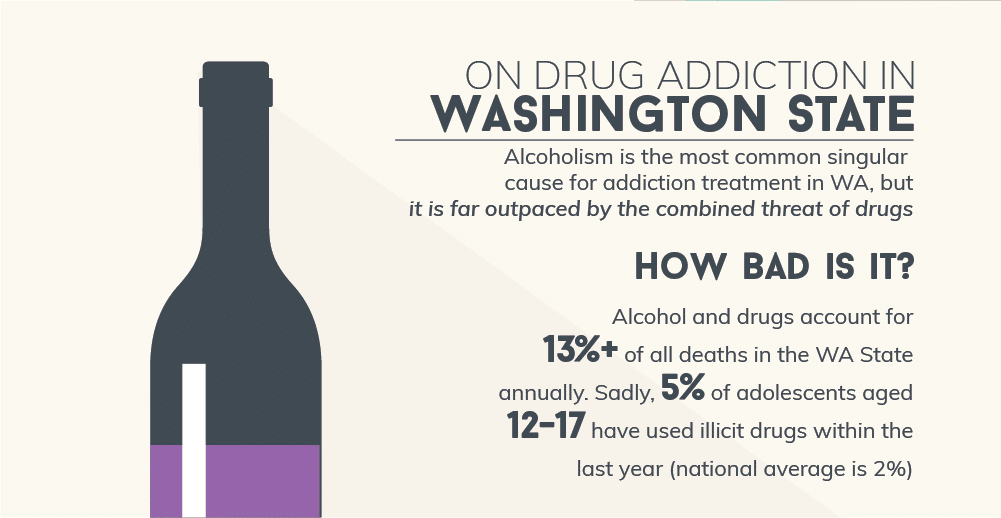
On Drug Addiction in Washington State
While alcohol addiction is the most common singular cause for addiction treatment in Washington, it is far outpaced by the combined threat of drugs. Be it meth, heroin, prescription drugs, or another other addiction-causing substance, there’s somebody in Washington that needs help with it, and there are places to help.
Drug overdose deaths continue to be a huge problem in Washington as they outpace the national average across the state.
Exactly how bad is it?
Alcohol and drug-related causes account for more than 13% of all deaths in the state annually.
That becomes much more upsetting when you find out that 5% of adolescents aged 12-17 have used illicit drugs within the last year – well over the national average of 2%. Drug abuse is a problem everywhere, but it’s statistically worse in Washington.
Of course, drug use is bad for your health even if you don’t overdose. Drug use can lead to organ failure, brain damage, fatigue, and even mental health issues like depression and Alzheimer’s.
Narcotics Anonymous is, yes, pretty much the same as Alcoholics Anonymous. They are an AA-affiliated program using effectively the same famous 12-step program that has proven to work for AA members. The difference, as you may have gathered, is that Narcotics Anonymous is a support group for people addicted to drugs, rather than alcohol.
Of course, that addiction can be anything from illicit drugs to prescription drug abuse to the recently legalized marijuana. NA supports people going through all sorts of struggles with addiction, and at all stages.
There are actually several branches of NA in Washington, based on location. Depending on where you are, you might consider:
- Northwest Washington Area NA
- Southwest Washington Area NA
- Northeast Washington Area NA
- Central Washington Area NA
- Seattle NA
If you’re not seeing the area you want, see the list of all the Washington (and Idaho)-area districts on the Washington-North Idaho region page.
Of course, just like AA, NA’s support program is spiritually-driven. If you’re looking for something different, SOS (Secular Organizations for Sobriety) and SMART Recovery are both viable options – for both drug and alcohol addiction support.
There most certainly is. While a smaller organization, Nar-Anon serves the same purpose for the loved ones of those on drugs that Al-Anon serves for those struggling with alcoholism.
Nar-Anon is a support group built to help you cope with the difficult time you’re not doubt having with your loved one’s addiction. While it gives you a safe, supportive place to talk about your struggles with people who understand you, it’s also a place to learn about your loved one’s struggles, and ways you can help them as well.
As the family or friend of someone going through addiction, you’re often their first line of defense when they’re feeling weak. And unfortunately, they’re also first to experience the backlash when they’re having a rough day. It’s undeniably a tough spot to be in. Nar-Anon can help you cope with it.
If there aren’t any support groups near you that fit your schedule, or if you’re not a “group” kind of person, you can always look to the internet for help.
There are message boards, forums, subreddits, and chat rooms all over just full of people waiting to help.
NA has a website that is a great resource for basic drug information. They also host discussion boards for people to gather at non-meeting times, ask questions, and discuss topics of interest.
SOS has a number of online groups for many different forms of addiction, even including substance abuse and eating disorders.
You can also find AA groups online. There are a number of ways to get support from these groups, from forums to chat rooms to phone groups.
There is always help near you if you look.
A common resistance to going to rehab or getting drug or alcohol treatment is fear about being able to afford it. And that’s understandable – addiction hits you in the wallet almost as hard as it hits you in the body and mind.
But there are ways to get help, regardless. Many health insurance providers include drug rehab as at least a partially-covered service. We even have an insurance verification form where you can check to see if your insurance covers you, and how much.
“Okay,” you say, “but I don’t even have health insurance, so I know I’m not covered.”
Well, if you don’t have health insurance, you can certainly get health insurance. There’s even a website especially for it! Go to www.healthcare.gov and find out how you can get assistance. If you still have questions, check out SAMHSA.gov. Here you can find information about the ACA and links with further information.
